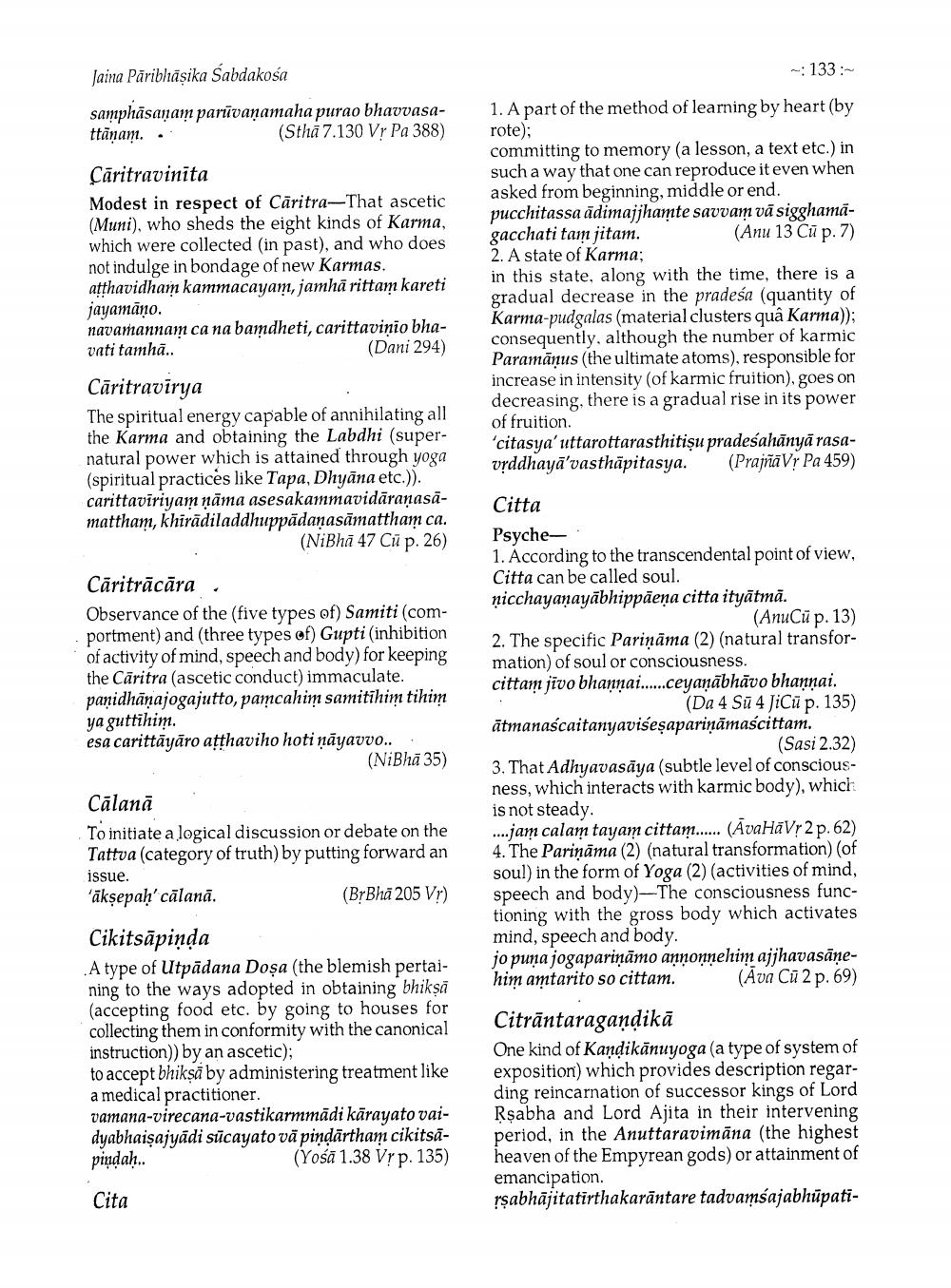________________
-: 133 -
Jaina Pāribltāșika Sabdakosa samphāsanam parūvaṇamaha purao bhavvasattānam..
(Sthā 7.130 Vr Pa 388)
Cáritravinita Modest in respect of Cāritra-That ascetic (Muni), who sheds the eight kinds of Karma, which were collected (in past), and who does not indulge in bondage of new Karmas, atthavidham kammacayam, jamhā rittam kareti jayamāņo. navamannam ca na bamdheti, carittavinio bhavati tamhā..
(Dani 294)
1. A part of the method of learning by heart (by rote); committing to memory (a lesson, a text etc.) in such a way that one can reproduce it even when asked from beginning, middle or end. pucchitassa ādimajjhamte savvam vā sigghamagacchati tam jitam.
(Anu 13 Cū p. 7) 2. A state of Karma; in this state, along with the time, there is a gradual decrease in the pradeśa (quantity of Karma-pudgalas (material clusters quâ Karma)); consequently, although the number of karmic Paramānus (the ultimate atoms), responsible for increase in intensity (of karmic fruition), goes on decreasing, there is a gradual rise in its power of fruition. 'citasya' uttarottarasthitisu pradeśahānyā rasaorddhagã casthöpitasa. (PrajñāVy Pa 459)
Cāritravīrya The spiritual energy capable of annihilating all the Karma and obtaining the Labdhi (supernatural power which is attained through yoga (spiritual practices like Tapa, Dhyāna etc.)). carittavīriyam ņāma asesakammavidāraṇasāmattham, khirādiladdhuppädanasāmattham ca.
(NiBhā 47 Cü p. 26)
Cāritrācāra Observance of the (five types of) Samiti (comportment) and (three types of) Gupti (inhibition of activity of mind, speech and body) for keeping the Cāritra (ascetic conduct) immaculate. panidhānajogajutto, pamcahim samitihim tihim ya guttihim. esa carittāyāro atthaviho hoti ņāyavvo...
(NiBhā 35)
Citta Psyche1. According to the transcendental point of view, Citta can be called soul. nicchayanayābhippāena citta ityātmā.
(AnuCup. 13) 2. The specific Pariņāma (2) (natural transformation) of soul or consciousness. cittam jivo bhannai......ceyaņābhāvo bhannai.
(Da 4 Sū 4 JiCū p. 135) ātmanascaitanyavisesapariņāmaścittam.
(Sasi 2.32) 3. That Adhyavasāya (subtle level of consciousness, which interacts with karmic body), which is not steady. ....jam calam tayam cittam... (AvaHäVr 2 p. 62) 4. The Parināma (2) (natural transformation) (of soul) in the form of Yoga (2) (activities of mind, speech and body)-The consciousness functioning with the gross body which activates mind, speech and body. jo puna jogapariņāmo annonnelimajjhavasāņehim amtarito so cittam. (Āva Cū 2 p. 69)
Cālanā To initiate a logical discussion or debate on the Tattva (category of truth) by putting forward an issue. 'āksepah' cālanā.
(BrBhā 205 Vr)
Cikitsāpinda A type of Utpādana Dosa (the blemish pertaining to the ways adopted in obtaining bhikṣā (accepting food etc. by going to houses for collecting them in conformity with the canonical instruction)) by an ascetic); to accept bhikṣā by administering treatment like a medical practitioner. vamana-virecana-vastikarmmādi kārayato vaidyabhaişajyādi sūcayato väpiņdārtham cikitsapindah..
(Yośā 1.38 V, p. 135)
Citrāntaragandikā One kind of Kandikānuyoga (a type of system of exposition) which provides description regarding reincarnation of successor kings of Lord Rşabha and Lord Ajita in their intervening period, in the Anuttaravimāna (the highest heaven of the Empyrean gods) or attainment of emancipation. rşabhājitatirthakarāntare tadvamsajabhüpati
Cita




